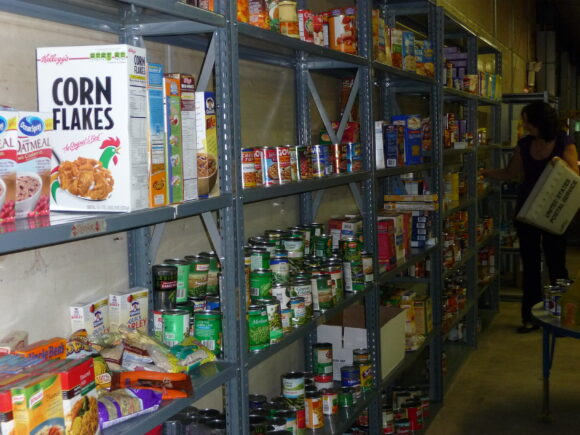More students are aware of the Rutgers Student Food Pantry at Rutgers University-New Brunswick and report using the pantry than they did in 2016, according to the findings of a 2019 survey that were presented on campus Thursday.
Cara Cuite, an assistant extension specialist in the Department of Human Ecology in the School of Environmental and Biological Sciences, shared the findings of the survey, which was done in 2019 and builds on an earlier study from 2016 and discussed the university’s efforts to support food insecure students.
“Our study represents the first systematic investigation of housing insecurity and homelessness at RU-NB and the second systematic investigation into food insecurity,” she said. “Our research will permit limited within-school comparisons on food insecurity over time as well as a comparison of Rutgers-New Brunswick to other universities around the country. Finally, and most importantly, the findings can guide institutional policies and programming to address basic needs insecurities.”
Cuite said these studies were conducted to better understand the prevalence of food insecurity, housing insecurity and homelessness among Rutgers-New Brunswick students. While hunger among U.S. college students is a growing problem nationwide, Rutgers-New Brunswick has taken steps to become a leader in addressing food insecurity on campus, according to the Basic Needs Insecurity Among Rutgers-New Brunswick Students report.
Fewer Rutgers students reported being food insecure in 2019 than in 2016, but the data do not necessarily indicate that the rate has decreased significantly, Cuite said. “This is because we used both different recruiting strategies and slightly different measurement tools as a result of changes in best practices in studying this issue,” she said. “However, there is evidence that food insecurity is being better addressed at Rutgers-New Brunswick from an institutional perspective.”
The 2019 survey shows many more students are aware of the Rutgers Student Food Pantry (20.1 percent in 2016 vs. 66.1 percent in 2019) and more students report using the pantry than in 2016 (0.3 percent in 2016 vs. 3.1 percent in 2019).
Cuite said this matches data from the Rutgers Student Food Pantry, which show the rate of use has increased significantly during the same time period. This is likely because of increased outreach over the past few years, including introducing the pantry during New Student Orientation, she said.
“These solutions include a range of programs, policies and partnerships to better meet students’ basic needs,” said Rutgers-New Brunswick chancellor Christopher Molloy who created the Student Essential Needs Task Force to better understand the issues student face and develop creative solutions to address the problems. “We are committed to addressing this important issue and to helping our students meet their full potential.”
Rutgers-New Brunswick created the Rutgers Student Food Pantry in 2016 and began to systematically study the prevalence, causes and consequences of food insecurity among its students, including a campus-wide survey of more than 8,000 undergraduate and graduate students. The survey found that 36.9 percent of Rutgers’ undergraduate students and 32.1 percent of graduate students were food insecure, indicating a need for increased programming and support services.
Since then, Rutgers-New Brunswick has created several programs based on best practices at other colleges and universities, such as meal swipe donations and assistance with SNAP enrollment. It also has piloted a Student Community Café that serves free lunch to students, as well as a food insecurity “screen and intervene” program conducted through Rutgers Student Health.
In addition, the Rutgers Student Food Pantry has created innovative partnerships with the Rutgers Student Farm at Rutgers Gardens, which grows food specifically for food insecure students, and the New Brunswick Community Farmers Market, to provide free fresh produce to food insecure students.
While the coronavirus pandemic has left most students learning remotely, the Rutgers Student Food Pantry has continued to serve students who have remained on campus as well as off-campus students that live close enough to use it. A van has delivered supplies to students who live in Piscataway across the river.
Salvador Mena, vice chancellor for Student Affairs at Rutgers-New Brunswick and Robert Goodman, executive dean emeritus and University Distinguished Professor, said they have spent the last year working to better understand these challenges, which also include alleviating housing insecurity and homelessness among students.
“Our Task Force comprises administrators, staff and faculty from across the university who work with students in a range of capacities and have a deep understanding of the challenges our students face and how issues of basic needs present in the broader society. Our charge is to examine the issues and barriers that impede students from maximizing their academic and co-curricular pursuits at Rutgers University. These issues include but are not limited to having access to food, financial resources, housing and mental health services,” Mena said.
Based on recommendations from the Student Essential Needs Task Force future surveys should explore additional needs, such as transportation, mental health and access to technology, Mena said.
Rutgers also has the opportunity to study basic needs insecurity in other regularly administered surveys of its students, such as the Student Experience in the Research University and the National College Health Assessment surveys, according to Cuite. This would permit an examination of connections between basic needs on other outcomes and topics under study, such as identity, mental health and violence, she said.
Authors of the Basic Needs Insecurity Among Rutgers-New Brunswick Students study were Cara Cuite, Rutgers Cooperative Extension and Rutgers Against Hunger; Stephanie Brescia, Graduate School of Education; Kerri Willson, Office of Off-Campus Living and Community Partnerships; Dayna Weintraub, Student Affairs Research, Assessment, and Planning; Mark Walzer, Graduate School of Education; and La Reina Bates, Office of Institutional Research and Academic Planning.
This article originally appeared on Rutgers Today.


